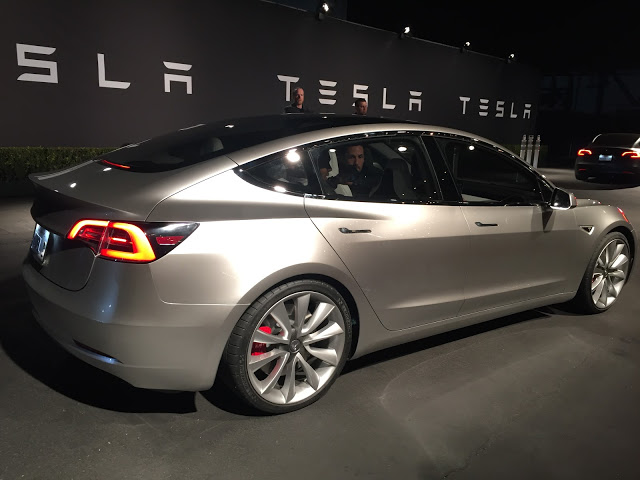
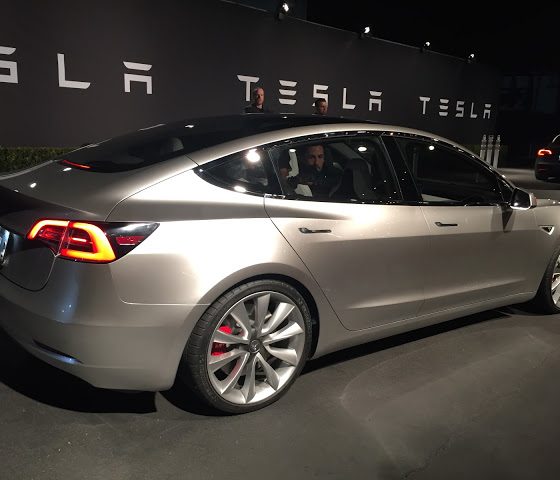
News
Watch Out: Tesla Model 3 Will Have Ludicrous Mode
The Model 3 could be the quickest Tesla ever
There could be a new king of the hill when it comes to being the quickest accelerating car in Tesla’s vehicle lineup if the latest tweet by Elon Musk holds true. When asked by @vigneshraju of Twitter on whether the Model 3 will have Ludicrous mode, Musk replied with a simple “of course”.
The remark has left many reservation owners across Twitter and forum groups to speculate on the type of battery, price, and performance improvement Ludicrous mode will bring to Tesla’s entry-level vehicle.
@vigneshraju of course
— Elon Musk (@elonmusk) April 30, 2016
Ludicrous mode was first introduced as an optional hardware upgrade to the Model S P85D: an upgrade that would allow the battery to draw more current, from 1300 to 1500 amps, and allow the electric motors to temporarily produce more power. The end result is unrivaled acceleration capable of catapulting the Model S from 0 – 60 mph in a blistering 2.6 seconds and down the 1/4 mile at 10.9 seconds, according to tests conducted by Motor Trend.
What will this mean in terms of performance when Ludicrous mode is enabled on a presumably much lighter Model 3 with smaller battery pack? And more importantly, how will this upgrade impact the overall cost of the vehicle?
Price of Tesla Model 3 with Ludicrous Mode
Make no mistake that 400k reservations of the Model 3 is largely due to the fact that it has a low cost of entry. At $35k you’re buying proven electric vehicle technology, low cost of ownership (cost per mile), and brand prestige.
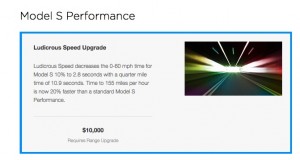 We know the base Model 3 will come standard in a rear wheel drive configuration, but add in dual motors – required in Tesla’s top of the line Performance models – electronically controlled air suspension (also required), and the optional rip-your-head-off Ludicrous mode upgrade, it wouldn’t be too far-fetched to double the cost of the vehicle. After all the Ludicrous Speed Upgrade on the Model S and X alone costs $10k, and that’s on top of the additional price paid to upgrade to the flagship Performance variation.
We know the base Model 3 will come standard in a rear wheel drive configuration, but add in dual motors – required in Tesla’s top of the line Performance models – electronically controlled air suspension (also required), and the optional rip-your-head-off Ludicrous mode upgrade, it wouldn’t be too far-fetched to double the cost of the vehicle. After all the Ludicrous Speed Upgrade on the Model S and X alone costs $10k, and that’s on top of the additional price paid to upgrade to the flagship Performance variation.
All said and done, a fully loaded Model 3 could reach $70k and surpass the base price of the Model S. But that won’t stop 15% of Model 3 buyers from going Insane to Ludicrous.
Tesla Model 3 Ludicrous Mode Performance
We know Ludicrous Teslas are quick. We recently saw the 6,000 pound Model X SUV destroy a Ferrari in a test of acceleration, and we’ve even witnessed a Ludicrous-enabled P90D Model S sedan take on a Boeing 737 jet. But will Tesla allow its entry-level vehicle surpass the performance of an equally-equipped Model S or Model X? The answer is likely no.
Accelerating quickly requires power derived from the battery. Current and voltage affects the amount of power the inverter delivers to the electric motors. But because the Model 3 will likely have a smaller battery, in order to keep costs down, the voltage produced from a smaller battery pack is lower than that of a larger pack, resulting in less power.
The Model S 70D is capable of accelerating to 60 mph in 5.2 seconds. Assuming the Performance version of the Model 3 will have a tuned version of the 70D battery with higher voltage, combined with a lower overall vehicle curb weight than the Model S, it wouldn’t be surprising if we saw low 3 second 0-60 mph times. It’s still quicker than Elon’s favorite performance benchmark the McLaren F1, while leaving bragging rights to its older and more expensive siblings.

News
Tesla FSD (Supervised) fleet passes 8.4 billion cumulative miles
The figure appears on Tesla’s official safety page, which tracks performance data for FSD (Supervised) and other safety technologies.

Tesla’s Full Self-Driving (Supervised) system has now surpassed 8.4 billion cumulative miles.
The figure appears on Tesla’s official safety page, which tracks performance data for FSD (Supervised) and other safety technologies.
Tesla has long emphasized that large-scale real-world data is central to improving its neural network-based approach to autonomy. Each mile driven with FSD (Supervised) engaged contributes additional edge cases and scenario training for the system.
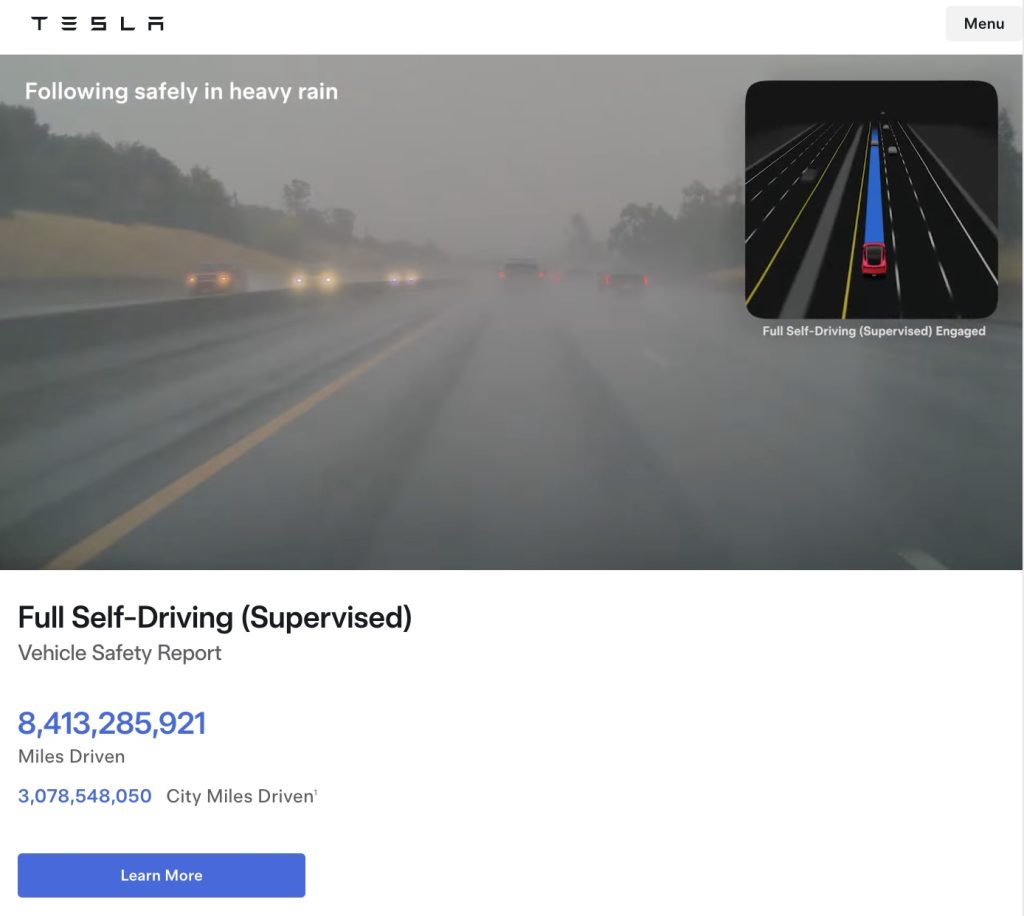
The milestone also brings Tesla closer to a benchmark previously outlined by CEO Elon Musk. Musk has stated that roughly 10 billion miles of training data may be needed to achieve safe unsupervised self-driving at scale, citing the “long tail” of rare but complex driving situations that must be learned through experience.
The growth curve of FSD Supervised’s cumulative miles over the past five years has been notable.
As noted in data shared by Tesla watcher Sawyer Merritt, annual FSD (Supervised) miles have increased from roughly 6 million in 2021 to 80 million in 2022, 670 million in 2023, 2.25 billion in 2024, and 4.25 billion in 2025. In just the first 50 days of 2026, Tesla owners logged another 1 billion miles.
At the current pace, the fleet is trending towards hitting about 10 billion FSD Supervised miles this year. The increase has been driven by Tesla’s growing vehicle fleet, periodic free trials, and expanding Robotaxi operations, among others.
With the fleet now past 8.4 billion cumulative miles, Tesla’s supervised system is approaching that threshold, even as regulatory approval for fully unsupervised deployment remains subject to further validation and oversight.
Elon Musk
Elon Musk fires back after Wikipedia co-founder claims neutrality and dubs Grokipedia “ridiculous”
Musk’s response to Wales’ comments, which were posted on social media platform X, was short and direct: “Famous last words.”
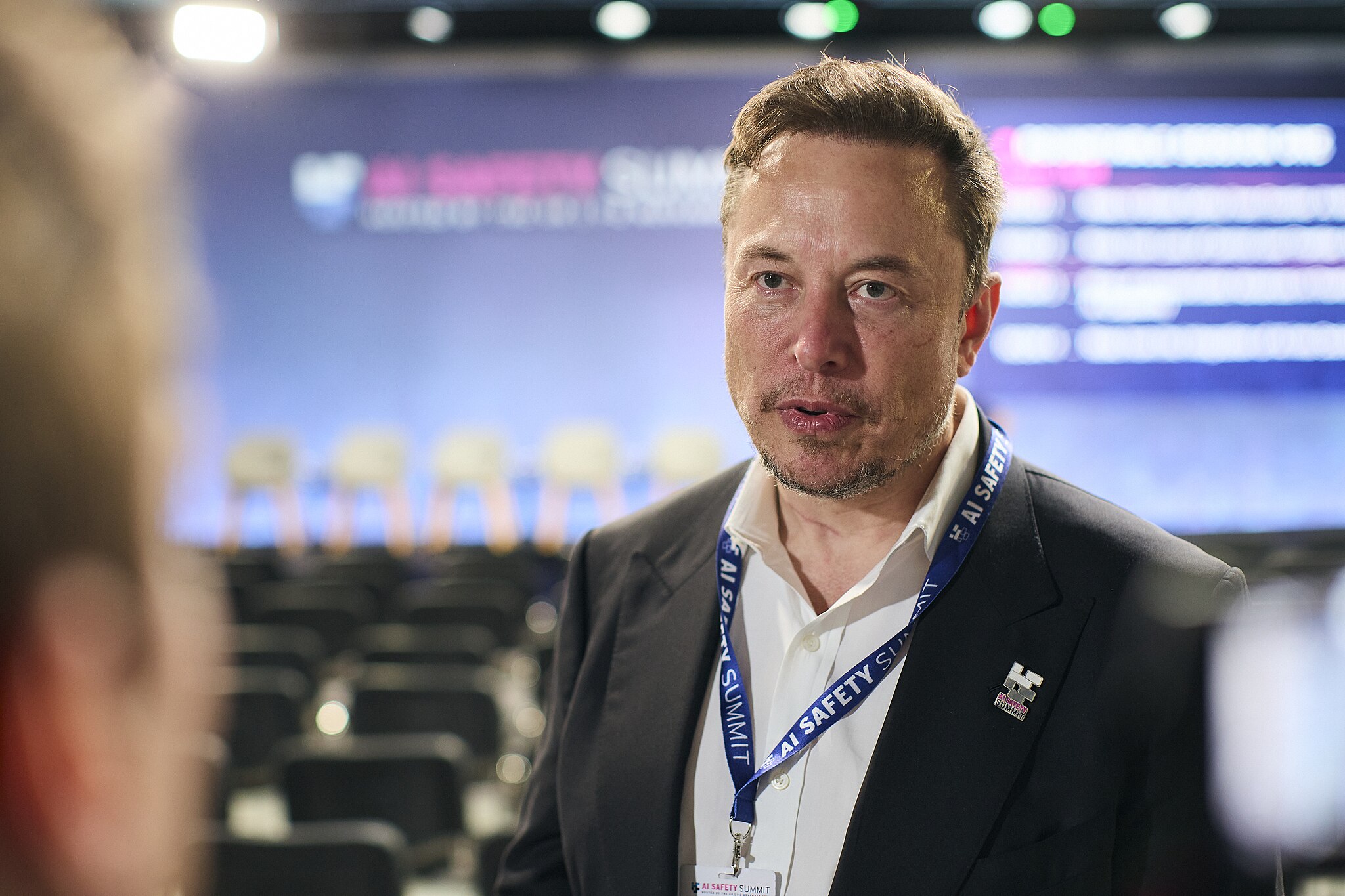
Elon Musk fired back at Wikipedia co-founder Jimmy Wales after the longtime online encyclopedia leader dismissed xAI’s new AI-powered alternative, Grokipedia, as a “ridiculous” idea that is bound to fail.
Musk’s response to Wales’ comments, which were posted on social media platform X, was short and direct: “Famous last words.”
Wales made the comments while answering questions about Wikipedia’s neutrality. According to Wales, Wikipedia prides itself on neutrality.
“One of our core values at Wikipedia is neutrality. A neutral point of view is non-negotiable. It’s in the community, unquestioned… The idea that we’ve become somehow ‘Wokepidea’ is just not true,” Wales said.
When asked about potential competition from Grokipedia, Wales downplayed the situation. “There is no competition. I don’t know if anyone uses Grokipedia. I think it is a ridiculous idea that will never work,” Wales wrote.
After Grokipedia went live, Larry Sanger, also a co-founder of Wikipedia, wrote on X that his initial impression of the AI-powered Wikipedia alternative was “very OK.”
“My initial impression, looking at my own article and poking around here and there, is that Grokipedia is very OK. The jury’s still out as to whether it’s actually better than Wikipedia. But at this point I would have to say ‘maybe!’” Sanger stated.
Musk responded to Sanger’s assessment by saying it was “accurate.” In a separate post, he added that even in its V0.1 form, Grokipedia was already better than Wikipedia.
During a past appearance on the Tucker Carlson Show, Sanger argued that Wikipedia has drifted from its original vision, citing concerns about how its “Reliable sources/Perennial sources” framework categorizes publications by perceived credibility. As per Sanger, Wikipedia’s “Reliable sources/Perennial sources” list leans heavily left, with conservative publications getting effectively blacklisted in favor of their more liberal counterparts.
As of writing, Grokipedia has reportedly surpassed 80% of English Wikipedia’s article count.
News
Tesla Sweden appeals after grid company refuses to restore existing Supercharger due to union strike
The charging site was previously functioning before it was temporarily disconnected in April last year for electrical safety reasons.
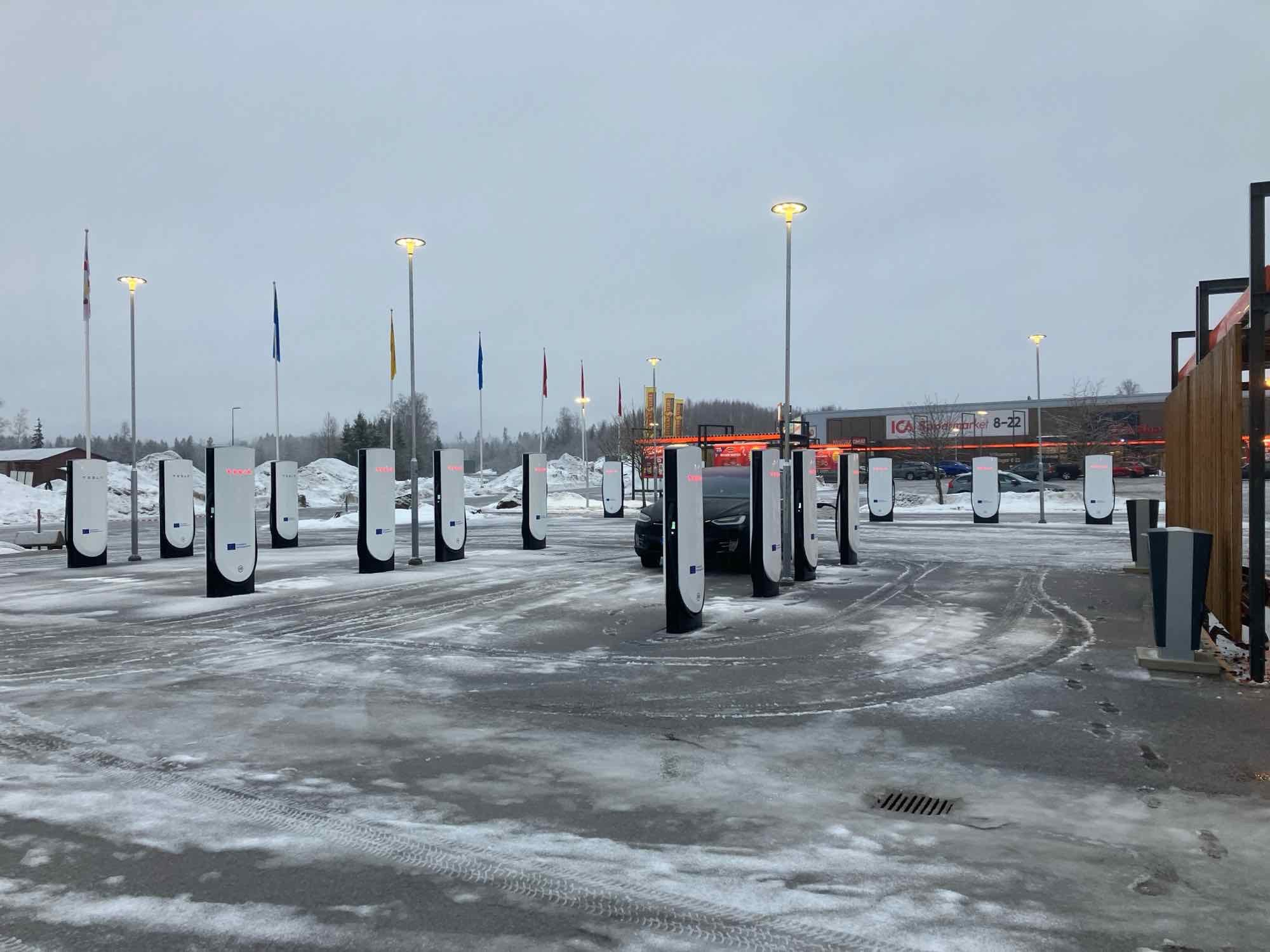
Tesla Sweden is seeking regulatory intervention after a Swedish power grid company refused to reconnect an already operational Supercharger station in Åre due to ongoing union sympathy actions.
The charging site was previously functioning before it was temporarily disconnected in April last year for electrical safety reasons. A temporary construction power cabinet supplying the station had fallen over, described by Tesla as occurring “under unclear circumstances.” The power was then cut at the request of Tesla’s installation contractor to allow safe repair work.
While the safety issue was resolved, the station has not been brought back online. Stefan Sedin, CEO of Jämtkraft elnät, told Dagens Arbete (DA) that power will not be restored to the existing Supercharger station as long as the electric vehicle maker’s union issues are ongoing.
“One of our installers noticed that the construction power had been backed up and was on the ground. We asked Tesla to fix the system, and their installation company in turn asked us to cut the power so that they could do the work safely.
“When everything was restored, the question arose: ‘Wait a minute, can we reconnect the station to the electricity grid? Or what does the notice actually say?’ We consulted with our employer organization, who were clear that as long as sympathy measures are in place, we cannot reconnect this facility,” Sedin said.
The union’s sympathy actions, which began in March 2024, apply to work involving “planning, preparation, new connections, grid expansion, service, maintenance and repairs” of Tesla’s charging infrastructure in Sweden.
Tesla Sweden has argued that reconnecting an existing facility is not equivalent to establishing a new grid connection. In a filing to the Swedish Energy Market Inspectorate, the company stated that reconnecting the installation “is therefore not covered by the sympathy measures and cannot therefore constitute a reason for not reconnecting the facility to the electricity grid.”
Sedin, for his part, noted that Tesla’s issue with the Supercharger is quite unique. And while Jämtkraft elnät itself has no issue with Tesla, its actions are based on the unions’ sympathy measures against the electric vehicle maker.
“This is absolutely the first time that I have been involved in matters relating to union conflicts or sympathy measures. That is why we have relied entirely on the assessment of our employer organization. This is not something that we have made any decisions about ourselves at all.
“It is not that Jämtkraft elnät has a conflict with Tesla, but our actions are based on these sympathy measures. Should it turn out that we have made an incorrect assessment, we will correct ourselves. It is no more difficult than that for us,” the executive said.









